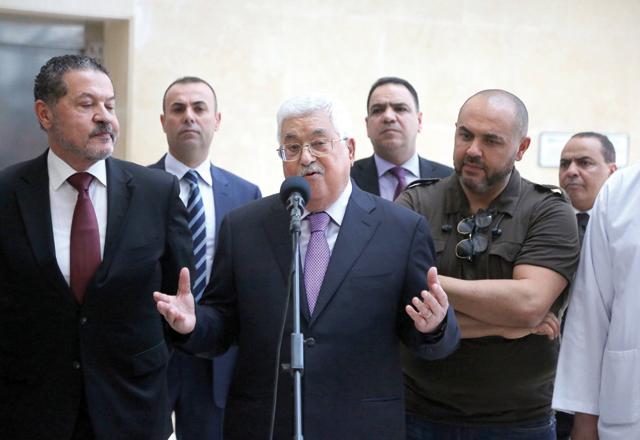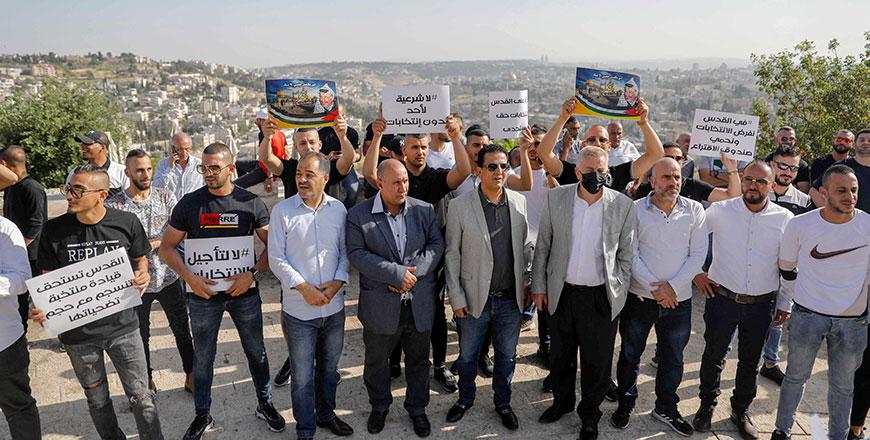You are here
Palestinian president leaves hospital after eight-day stay
By AFP - May 29,2018 - Last updated at May 29,2018

Palestinian President Mahmoud Abbas gives a short statement before leaving a hospital near Ramallah in the occupied West Bank on Monday following eight days of treatment for pneumonia (AFP photo)
RAMALLAH, Palestinian Territories — Palestinian President Mahmoud Abbas left hospital on Monday after eight days of treatment for pneumonia that led to intense speculation over the 83-year-old's condition and who will eventually replace him.
Dressed in a suit as usual and walking without assistance, Abbas gave a short statement on being discharged, saying he planned to be back at work in his office as normal on Tuesday.
"Thanks to God, I left the hospital today in good health and return to work starting tomorrow," he said, speaking vigorously and with his two sons by his side.
He thanked all international leaders who had called about his health and wished him well.
The hospital stint came at a time of heightened US pressure on Abbas and the Palestinian Authority.
Some analysts said Abbas would now seek to refocus on work and downplay talk of stepping down. He is expected to preside over a meeting of the central council of his Fatah party on Tuesday.
Known to be a heavy smoker, Abbas was admitted on May 20 to the Istishari Arab Hospital near Ramallah in the occupied West Bank with complications following an ear operation, including high fever.
Officials have since said he was being treated for pneumonia.
His extended hospitalisation led to widespread speculation over whether his condition was worse than the details being disclosed.
No successor is publicly in line for the Palestinian presidency, which has added to concerns over Abbas’ health.
Abbas won a four-year term as president in 2005, but he has since remained in office without further elections.
He argues the split between his Fateh Party and Islamist movement Hamas, which controls the Gaza Strip, has made elections politically impossible.
Pretend it ‘didn’t happen’
A moderate, Abbas has been involved in decades of negotiations with Israel but is unpopular among Palestinians, with the majority wanting him to step down.
Many Palestinians see his approach to negotiations as having failed to end the Israeli occupation and are nowhere near the goal of securing statehood.
Israeli officials, while criticising what they see as his intransigence, greatly value the security coordination, which his administration has provided.
Abbas succeeded Yasser Arafat, the charismatic keffiyeh-wearing leader who was revered by Palestinians.
Though Abbas has been valued by the international community due to his belief in negotiations and stated opposition to violence, he has struggled to meet Palestinians’ expectations left behind by Arafat.
In recent months, Abbas has faced what the Palestinians see as the blatant bias of US President Donald Trump’s administration.
Abbas froze all ties with the White House over Trump’s decision to recognise Jerusalem as Israel’s capital
The United States has also frozen tens of millions of dollars in aid to the United Nations agency for Palestinian refugees and has threatened to close the office of the Palestine Liberation Organisation in Washington.
Abbas has sharpened his rhetoric against US officials.
In a recent speech, he called US ambassador to Israel David Friedman, who has been a supporter of Israeli settlements in the West Bank, a “son of a dog”.
Abbas made reference to Trump’s Jerusalem declaration when leaving the hospital, suggesting it had weighed heavily on him.
“If the issue of Jerusalem brought us to the hospital, we wanted to get out of the hospital to make Jerusalem the capital of Palestine,” he said.
Israel sees the entire disputed city as its capital, while the Palestinians want the annexed eastern sector as the capital of their future state.
Nour Odeh, a political analyst based in Ramallah, said the president would seek to use the Fatah central council meeting to refocus on the opposition to Israeli and US policy.
“I don’t doubt that the recent events will have an impact — the president is not young,” she said, adding he seemed to have been suffering from fatigue in the weeks before his hospitalisation.
Diana Buttu, a former Abbas aide who became a fierce critic, said Abbas would seek to quash all talk of succession.
“He is going to pretend this whole thing didn’t happen. It will be business as usual, as though an 83-year-old didn’t have serious pneumonia,” she told AFP.
“Other politicians know that if they talk about succession they will be out.”
Related Articles
RAMALLAH, Palestinian Territories — Palestinian leaders were set to decide on Thursday whether to hold elections next month as scheduled or
HEBRON — Confrontations erupted between Palestinians and Israeli forces Monday during demonstrations marking the 15th anniversary of Yasser
RAMALLAH, Palestine — The Yasser Arafat Museum opened Wednesday in Ramallah, shedding light on the long-time Palestinian leader's life and o

















